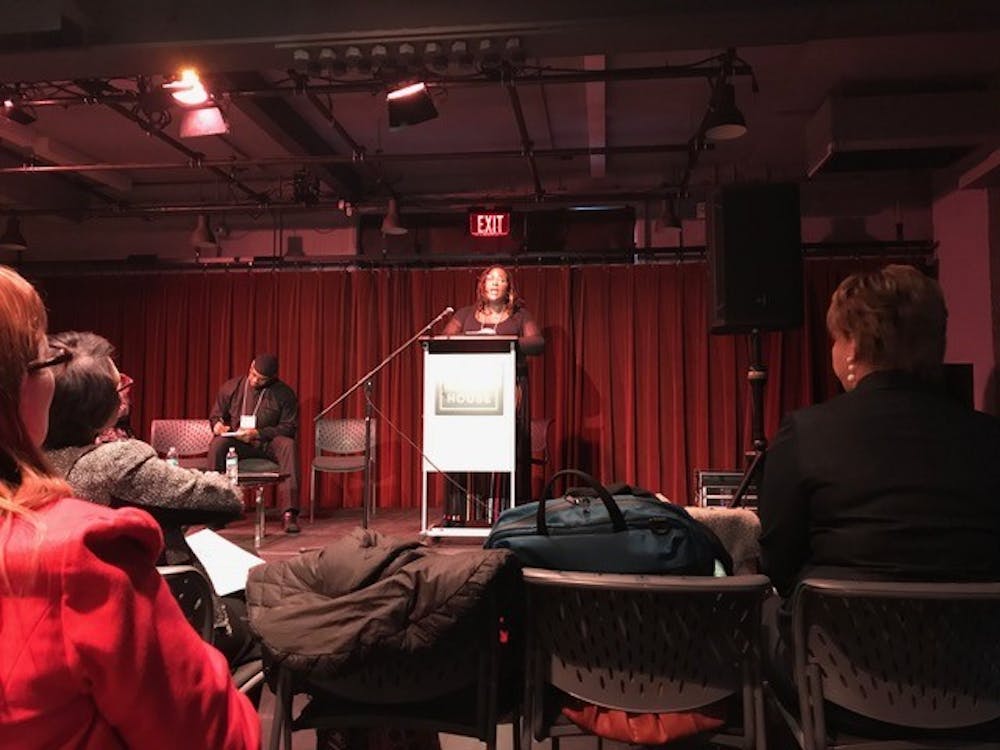The Hopkins Center for Africana Studies (CAS) partnered with the Iowa State University College of Human Sciences to host a symposium titled “Bound/Unbound: Contemporary Black Marriage in Research, Policy, and Practice” in Station North on March 8 and 9.
The symposium aimed to engage attendees in discussions on the different functions of marriage in contemporary black communities.
Starting in August 2017, Katrina Bell McDonald, associate professor in CAS and Sociology, partnered with Jessica Marie Johnson, associate professor in CAS and History, and Tera Jordan, assistant professor in the Department of Human Development and Family Studies at Iowa State, to organize “Bound/Unbound.”
McDonald discussed the importance of bringing conversations about black marriage into public discourse.
“We really hadn’t had a gathering of this sort in the nation that I’m aware of,” she said. “The more general conversations about marriage still have not paid fair enough attention to the uniqueness of black relationships.”
The first day of the symposium consisted of a keynote speech by Director of Research and Program Evaluation at the Young Women’s Christian Association Alicia Sanchez Gill, followed by three panels.
One of the panels, titled “Methods and Data,” focused on research conducted through literature and sociology on the field of black marriage.
Panelist Marlo David, director of African-American Studies at Purdue University, discussed the representation of black mothers in popular media.
“Black writers, filmmakers and other cultural producers are... choosing to write about the single mother,” she said. “They’re rejecting in some ways the neoliberal notion that if we’re not representing blackness positively and aspirationally, that somehow we’re doing our culture a disservice.”
Another panel, titled “Social Policy,” was composed of four panelists.
Panelist Amber J. Phillips, a reproductive justice advocate, emphasized the need to include black women in conversations about black identity.
“We’re often [told] that we should be quiet and let the race succeed,” she said. “You can’t be pro-black unless you’re pro-black women.”
Phillips highlighted the importance of making the media more accessible for black communities. She called on the audience to use social media platforms to engage with black people not involved in academia.
Next, panelist Andrew Cherlin, chair of the Sociology department, discussed how meeting families’ basic needs should come before parenting and family skills training.
“Marriage is not the end. It is one way, an important way, but not the only way to achieve the greater goal, which is stable environments for children who have their basic needs met,” he said.
The three sessions on Friday, March 9 included “Developing Op-Ed Pieces Supporting Black Marriage Scholarship and Policy,” “Collaborative Workshop on Developing Course Syllabi on Black Marriage and Relationships” and “Love and Marriage in Slavery’s Archive: A Workshop with Tera W. Hunter.”
The final session was a special roundtable discussion at Red Emma’s featuring a book by Tera Hunter, History and African-American Studies professor at Princeton University, titled Bound in Wedlock: Slave and Free Black Marriage in the Nineteenth Century.
The session featured panelists’ discussions about Hunter’s book.
Panelist Vanessa Holden, associate History professor at the University of Kentucky, brought up the specific challenges that queer marriage, particularly black queer marriage, still faces, expressing concern about legislation that makes it a lot more difficult, though not illegal, for queer couples to marry in certain states.
“Individual judges and county clerks do not have to issue marriage licenses to same-sex couples. The legislation still needs to pass Alabama’s house, but... similar legislation has been proposed in [other states],” she said.
Panelist Katrina Bell McDonald discussed her own family, particularly her grandfather, who had three wives. She said that contrary to the negative connotations that society associated with this, her family felt normal and whole.
Panelist Shani Mott, a lecturer in CAS, addressed the commodification of black marriage and contradicted the idea that the man in a marriage should bring skills or wealth to the marriage, and said that a marriage should simply be a partnership in its own right.
Junior Marissa Varnado spoke to the personal impact that “Bound/Unbound” had on her.
“It was a really transformative experience to be around that many academics who study something that’s so specific and so many minority academics that are role models for me,” she said. “To see that many people who are interested in it was heartening.”





